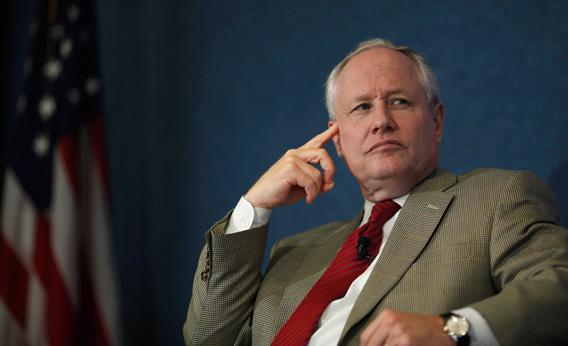If he’s paying attention to Washington right now, Russian President Vladimir Putin is discovering how quickly Americans can change their minds. One week ago, Putin was a vaguely menacing autocrat. Today, he’s a far-sighted ally who could have told us that the Tsarnaev brothers, two Muslims with roots in Chechnya, would be trouble. Jacob Heilbrunn has asked whether the bombings in Boston meant “vindication” for Putin. My colleague Fred Kaplan reported that “Russian intelligence services are all over Chechen radicals,” and speculated that “Boston may serve as an opportunity for these two powers to start over.”
Our sudden outbreak of Russophilia can be traced to one simple fact about the Boston investigation. In 2011, “a foreign government asked the FBI for information about Tamerlan Tsarnaev,” who’d arrived in the United States nearly 10 years earlier. (His brother arrived a little later.) The bureau complied. Finding nothing and later flummoxed by an airline’s clerical error, the United States allowed Tsarnaev to take a lengthy trip to Russia. On Monday, Kentucky Sen. Rand Paul wrote a letter to Senate leaders asking why “the current [immigration] system allows two individuals to immigrate to the United States from the Chechen Republic in Russia, an area known as a hotbed of Islamic extremism, who then committed acts of terrorism?”
Paul mangled some minor details of the story. The Tsarnaevs probably arrived in the United States from Kyrgyzstan, and their European relatives now live in the Russian republic of Dagestan. But that’s beside the point. Asking whether Putin and Russia were right about Chechnya, and about terrorism—that hasn’t been done for years.
When it was done, it was mostly a matter of realpolitik. In 1991, Chechnya proclaimed independence from the Russian Federation. In December 1994, Russian forces attacked the breakaway republic and spent years pacifying it. The United States didn’t really do anything about this. At an April 1996 press conference, flanked by Russian President Boris Yeltsin, Clinton even gave the Russians a somewhat dark atta-boy. “We once had a civil war in our country,” said Clinton, “in which we lost, on a per capita basis, far more people than we lost in any of the wars of the 20th century, over the proposition that Abraham Lincoln gave his life for, that no state had a right to withdrawal from our union.” Three months later, Yeltsin was safely re-elected; one month after that, the first Chechen War came to an end.
And three years later, the second Chechen War began. This one raised hackles in the States. Observers in Russia, like Anne Applebaum, came back with ominous stories of the (literally) ailing Yeltsin government painting all Chechens as “blacks” and “terrorists.” In 1999, a team of foreign policy hands—some of whom didn’t yet mind being called “neoconservatives”—formed the American Committee for Peace in Chechnya. Headquartered at the democracy-promotion think tank Freedom House, it held meetings and placed columns, a steady awareness-raising campaign to describe just how brutal the Russians were being.
These skeptics found their moment after 9/11. Yeltsin had resigned, leaving Putin with the presidency and a war that he carried out with broad popular support. Putin presented himself as a natural ally who understood exactly what Americans were going through. “Putin does not come to us with clean hands in dealing with Muslims,” wrote Stephen Schwartz in a post-9/11 issue of the Weekly Standard. “In our new effort to gain Muslim allies and supporters Americans can only harm our cause by appearing to sign off on the continued mistreatment of a small, isolated people.”
Gaining Muslim allies—easy to forget, but that was what neoconservatives aspired to after 9/11. Agitating for the overthrow of Saddam Hussein and announcing solidarity with non-radicalized Chechens were simultaneous causes. The American Committee had its own specific successes, like an August 2002 peace summit (on the very neutral turf of Lichtenstein). Occasionally these whack-a-mole D.C. “letterhead” groups, the ones that start up to agitate for a cause from a think tank’s spare rooms, score some wins. (Some of the people listed as committee members, like Eliot Cohen, say they probably just signed a letter from the group.) The American Committee’s long-term win was preventing Putin from credibly describing everything he did as just another piece of the “global war on terror.”
That win didn’t survive long past the Bush years. Conservatives don’t trust the Obama administration to define or name Islamic terrorism. “Tamerlan Tsarnaev is the fifth person since 9/11 who has participated in terror attacks after questioning by the FBI,” wrote Bush’s last attorney general, Michael Mukasey, in a Wall Street Journal op-ed on Sunday. One country’s serious about “radical Islam”; one isn’t, and you hardly need to point out which.
Chechens are understandably spooked. In an interview with Michael Moynihan, Chechen prime-minister-in-exile Akhmed Zakayev called the Boston bombings a “gift” to the Russians. “Three years ago,” he pointed out, “Putin said that Western nations granting political asylum to Chechens will have problems with these Chechens.” And he was being proven right, wasn’t he?
Conservatives are still figuring that out. In a weekend podcast, Boston conservative talk-radio host Michael Graham prodded Bill Kristol about what the Russians might have to teach America. “These are the Russians,” said Graham. “They’re used to dealing with rough characters.”
Kristol urged some caution. “There’s a sense—I don’t necessarily disagree with this—you have to discount [that],” he said. “Maybe they’re trying to get us to be suspicious of every Chechen who came to the U.S., especially of everyone who came as a political refugee.” But Kristol had to admit (based on some secret sourcing) that when it came to Tsarnaev the “Russians didn’t just throw out this name. They had a pretty detailed dossier of his contacts.” If conservatives want the Tsarnaevs to be seen as “enemy combatants,” they’re combatants in a war Americans thought they’d rejected years ago.
